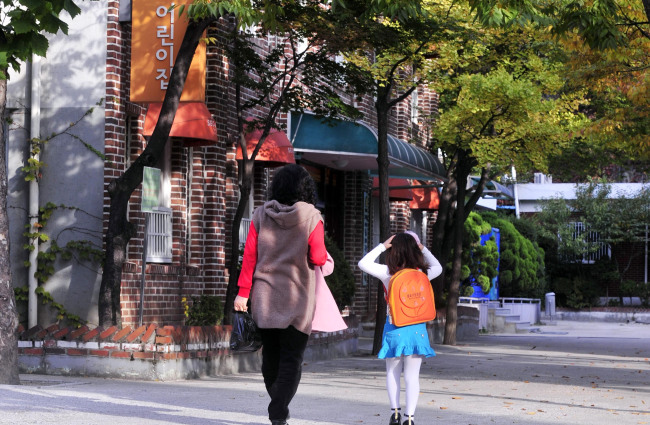Koreans are starting to learn English at younger and younger ages. After having seen many failures in English education in public schools, many people are seeking ways to learn the language naturally and early on so that it becomes like a mother tongue, rather than studying it consciously as an academic subject.
Most of the time, the starting age for English learning is determined by the parents. Many believe that the earlier their children begin to learn the foreign language, the more likely they will speak English at a native level.
“The age when a child starts to learn English depends on his or her mother’s decision. For some people, English language education starts in the womb. Pregnant women eager to see their children speak English well start their day listening to CNN news and then spend the whole day listening to English songs and stories,” said a mother who asked to have her name withheld.
Parental attempts to teach children English when they are so young that they cannot even speak Korean is largely due to frustrations they felt when they learned English. The adult generation, which still finds it difficult to speak English after many years of studying it in school, say they don’t want English to be a handicap for their children’s studies and career.
“I don’t want my kid to face any obstacles in achieving whatever she wants or plans to do in the future. I hope English will not get in her way,” said another mother whose child attends an elementary school in Seoul. She did not want her name to be revealed.
Riding on Koreans’ unquenchable longing to speak fluent English, the number of English-language kindergartens surged nationwide from 181 in 2009 to 259 in 2013, according to a report by the Education Ministry submitted for a parliamentary audit last year.
Parents never seem to skimp when it comes to English education for their children as long as it is effective, even if they have to pay about 10 to 12 times more than the monthly tuition of regular kindergartens. According to a report on nationwide English-language kindergartens released by the ministry, monthly tuitions of an English-language kindergarten were as high as 1,180,000 won to 1,280,000 won ($1,107 to $1,200). Those expensive kindergartens are concentrated in the affluent Seoul districts of Gangnam, Seocho and Songpa.
According to the Korea Institute of Child Care and Education, parents residing in metropolitan areas spend an average of 169,300 won a month on private education.
Advantage of starting early
While English is not commonly spoken in everyday life in Korea, English-language kindergartens and private institutions implement immersion education, while touting the advantages of early English education.
KONIS, an English-language kindergarten located in the well-off neighborhood of Pyeongchang-dong, northern Seoul, runs what it calls the total immersion program under which kids aged 3 to 7 participate in a pre-school Montessori curriculum conducted in English.
“I was inspired by kids whose parents are of a different nationality. They grow up in a multilingual environment where they can pick up two or three languages without any difficulty,” said Lee Yeon-sook, headmaster of KONIS.
“Here, kids can kill two birds with one stone. They acquire English as they are exposed to the language for five hours here, and when they go home they hear Korean,” she added.
In each class, a foreign instructor is paired with a Korean instructor who speaks both Korean and English. Both Korean- and English-speaking instructors respond to students in English even if a child requests something in Korean.
“The point is to expose a child to English constantly. The younger they are, the more comfortable they will feel with speaking English,” she said. “We don’t have level tests which separate children who speak better and who don’t. We just expose kids to the language as much as possible.”
Most parents, who learned English through textbooks at schools, believe such immersion will help their children pick up English naturally. Some parents of KONIS students wish their kids could continue to immerse themselves in an English-speaking environment after school.
“I would like my kids to get used to reading, discussing, making presentations and writing all in English. Perhaps they get a penalty when speaking Korean too,” said the mother of a graduate.
Learning at the right time, not too early
However, Lee Byung-min, professor of English education and director of the Foreign Language Education Center at Seoul National University, argues that the age factor is one of many variables in achieving proficiency in a foreign language.
“In Korea, an early start is regarded as an ultimate solution to reaching a high level of language proficiency,” he said. “A lot of factors have to be taken into consideration such as instructors, methods of learning, stimulation or motivations.”
Lee Jeong-mi, who has been teaching children at an English-language kindergarten in South Chungcheong Province, said it’s not late for children to learn English after they learn how to read and speak Korean.
“A child who doesn’t know how to read or speak Korean finds it difficult to make progress in learning English. But those who can read Korean can learn English quickly,” she said. “Those who can read and speak Korean do better in English too.”
The World Without Worries about Private Education, a civic group against private education, note in the booklet “Wasted Time Learning English” that early English education doesn’t always guarantee one’s language proficiency. In the brochure published in 2011, experts wrote that starting English education at the right time rather than too early is important and that those who learn early on don’t always outperform those who don’t.
By Lee Woo-young (
wylee@heraldcorp.com)






![[Herald Interview] 'Trump will use tariffs as first line of defense for American manufacturing'](http://res.heraldm.com/phpwas/restmb_idxmake.php?idx=644&simg=/content/image/2024/11/26/20241126050017_0.jpg)
![[Exclusive] Hyundai Mobis eyes closer ties with BYD](http://res.heraldm.com/phpwas/restmb_idxmake.php?idx=644&simg=/content/image/2024/11/25/20241125050044_0.jpg)
